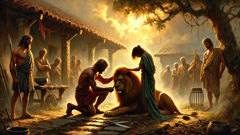Introduction
At the sunlit edge of an ancient Greek forest, where the wild olive trees rustle in warm breezes and the marble-blue sky stretches endlessly overhead, there once lived a lion whose name echoed through the valleys—Leonidas, the King of Beasts. He was mighty, with a mane as golden as wheat swaying in the fields and eyes as fierce as the noonday sun. Travelers and villagers alike whispered tales of his strength, how he roared at storms and sent wolves running with a single glare. Yet, beneath that formidable exterior, Leonidas harbored a secret longing. For beyond the shadowy boughs, just where the forest gave way to the gentle slopes of Arcadia, there was a village brimming with life. Here, peasants tilled the earth, children played in the dappled light, and laughter carried on the wind like birdsong. Among them was a woodman, stout and clever, and his daughter, Callista—a maiden as radiant as a midsummer dawn, with hair the color of chestnuts and a spirit bright as the first wildflowers of spring. Each day, Callista wandered the forest’s fringe, gathering herbs and wildflowers, her song drawing the curious gaze of every living thing. The birds fluttered closer when she sang, deer paused to watch her dance through shafts of light, and even Leonidas, hidden in the shadows, found his heart stirred by a feeling he’d never known. It was love—pure and sudden, like a bolt from Zeus himself. But how could a lion, feared by all, hope to win the affection of a human maiden? Leonidas wrestled with the question as days turned to weeks, his heart growing heavier with longing. He paced beneath moonlit trees, caught between his wild nature and the gentle hope that perhaps, just perhaps, love could tame even the fiercest soul. Thus begins a tale older than memory—a fable not just of beasts and mortals, but of the choices we make when love tests our very nature, and of the wisdom that waits for those willing to listen. For in this ancient land, where gods and mortals brushed shoulders and lessons were learned beneath the olive’s shade, even the strongest heart may be humbled, and the wildest beast discover what it means to be truly brave.
The Lion’s Longing and the Village’s Whispered Fears
Leonidas, King of the Forest, prowled his leafy realm with the pride of one who knows his own power. Yet since the first moment he’d glimpsed Callista dancing at the forest’s edge, something inside him had shifted. Each day, he watched her return: her laughter echoing like music, her hands weaving garlands from lavender and thyme, her kindness visible even in the way she knelt to rescue a tangled fawn or set a bird free from a snare. At first, Leonidas kept his distance. The villagers spoke of him in hushed voices—of his yellow eyes gleaming from the undergrowth, his thunderous roar. Mothers called children indoors at dusk, woodcutters traveled in wary pairs, and even hunters avoided the densest thickets. Yet Callista, unafraid, continued her wanderings, sometimes pausing to gaze into the trees as if she sensed a presence just out of sight.

Leonidas grew obsessed. He memorized the patterns of her days, the song she hummed as she picked wild oregano, the way she twirled a lock of hair when deep in thought. A peculiar ache gnawed at him—a longing more powerful than hunger, more persistent than thirst. He began to dream not of the hunt, but of walking beside her, of sharing the sun-dappled afternoons, perhaps even of speaking with her as mortals did. The thought was as wild as he was.
One evening, as the cicadas chirred and shadows stretched across the valley, Leonidas made a choice. He would reveal himself. He crept from the forest’s edge just as Callista, basket in hand, bent to pluck a sprig of mint. She straightened and froze. For a heartbeat, only the wind moved. Then, instead of running, Callista met his gaze. “You are the lion they speak of,” she said softly, her voice steady though her heart pounded.
Leonidas bowed his great head. In his own tongue—a language of gestures, growls, and glances—he tried to convey his gentleness. He lay upon the grass, paws crossed, tail flicking slowly, ears flat in submission. Callista, wise beyond her years, sensed no malice. Over the coming days, their strange friendship blossomed. She left little offerings—honeycomb, cool water, a woven circlet of clover. Leonidas responded with gifts of his own: a perfect feather, a smooth river stone, sometimes even a rare flower carried carefully in his jaws.
But word spread quickly. The woodman, Callista’s father, grew anxious. “A lion, child? Such creatures aren’t meant to walk beside us.” The villagers worried for her safety, fearing that the beast’s nature would surface and tragedy would follow. Yet Callista insisted, “He is not what you think. His eyes are sad, and his heart is gentle.”
The tension in the village simmered like a kettle over flame. Some urged the woodman to drive the lion away; others whispered of traps and poison. But Callista pleaded for Leonidas’s life, her loyalty unwavering. Unbeknownst to them all, Leonidas nursed a hope far greater than mere friendship: he wanted to make Callista his mate, to join her world and leave behind the loneliness of the wild. He paced beneath moonlit trees, torn between hope and dread, uncertain whether love could ever bridge the chasm between beast and mortal.
The Bargain of Love: A Lion’s Sacrifice
The days passed and Leonidas’s devotion deepened. Unable to bear the growing divide between himself and Callista’s world, he decided to approach her father with a bold request. At dawn, as mist still curled above the village fields, the lion strode into the woodman’s yard. The villagers gasped and retreated behind doors and fences, eyes wide with terror. But the woodman, emboldened by his daughter’s faith and his own desperate love for her safety, stood his ground.

Leonidas lowered his head in respect, then pressed his forehead to the earth. In a voice that rumbled low and strange—a gift, perhaps, from the gods—he spoke: “Woodman, my heart is not as fierce as my claws. I love your daughter with all that I am. Let me prove it: I will do whatever you ask if you let me be near her.”
The villagers, peering from windows, heard the plea and murmured among themselves. The woodman, clever and wary, recognized an opportunity. He turned to his daughter, whose eyes shone with tears and hope, then addressed the lion: “Leonidas, if your love is true, prove it not with words but with deeds. Your claws are sharp and your teeth are fearsome. Would you give up your strength and your fangs for Callista’s sake?”
The question was cruel but pointed. Leonidas hesitated, the weight of his decision pressing down like a mountain. To surrender his claws and teeth would mean losing not only his power but his very identity. He would be defenseless, at the mercy of every threat in the wild—a lion no more. Still, he gazed at Callista and saw only kindness in her eyes. “I will do it,” he said quietly.
The woodman fetched heavy shears and a hammer, tools meant for wood and stone but now pressed into a new service. The villagers gathered, uncertain and awed. With trembling hands, the woodman trimmed Leonidas’s claws, dulled his fangs, and filed down his teeth. The lion bore it all in silence, pain flashing in his golden eyes but his resolve unbroken.
When it was done, Leonidas stood—smaller somehow, shorn of his fearsome gifts. The children crept closer, emboldened now that the beast was tamed. Some even dared to stroke his mane. The woodman nodded, satisfied. “You have proven your love, great lion. But let us see if love alone can keep you safe in a world such as ours.”
Callista wept for him—part in gratitude, part in grief. “Oh Leonidas, what have you done?” she whispered, stroking his face. But the lion only smiled—a sad, resigned smile that spoke of hope despite everything lost.
The Lion’s Humbling and Wisdom’s Triumph
Leonidas was changed. No longer did the ground tremble beneath his paws or rabbits scatter at his approach. He moved softly now, each step a careful negotiation between pain and pride. The children laughed as they dared to pet him; the elders nodded in approval, convinced that danger had passed. The woodman kept a wary eye on the lion, still uncertain what the future might bring.

For a brief while, Callista and Leonidas enjoyed their time together more openly. They walked beneath the ancient olives, watched the golden sun set over distant hills, and shared quiet moments at the forest’s edge. Yet even in these stolen hours, a shadow lingered over their happiness. Leonidas could not hunt or defend himself. He relied on gifts from the villagers—scraps of bread, fruit, and water left at the door. The other creatures of the forest, once awed by his presence, now regarded him with indifference or even contempt. Foxes stole from his cache, crows jeered at him from the branches, and wolves prowled closer each night.
One dusk, as Callista rested against a tree and Leonidas dozed at her feet, a pack of wolves emerged from the thickets. Their eyes glowed green in the fading light; their leader bared his teeth in a cruel smile. “Well, well,” he sneered, “the king has fallen.” They circled Leonidas, who tried to stand tall but wobbled on weakened legs.
Callista stepped between them. “Leave him be! He means no harm.”
The wolves laughed. “He can’t protect you, girl. He is no king—only a shadow.”
Desperate, Leonidas growled, but the sound was hollow. The wolves lunged. It was only the sudden arrival of the woodman, wielding his axe and shouting for help, that drove them away. Still, the message was clear: love had cost Leonidas everything that made him strong.
In the days that followed, the villagers pitied him. Some tried to help; others shook their heads at the foolishness of beasts and men alike. Callista nursed Leonidas’s wounds and wept for him, but even her gentle care could not restore what he had lost. The lion grew thin and weak, his mane dull. He lay beside Callista and whispered, “Was my sacrifice for nothing?”
She squeezed his paw. “You have shown me the greatest love—one that gives all. But love must be wise as well as brave.”
The woodman, watching this sorrow unfold, felt a pang of guilt. He approached Leonidas and said quietly, “You have taught us something I did not expect: that strength is not only in claws or teeth, but in kindness and humility. Still, it was wrong to ask you to abandon your nature.”
As the moon rose over Arcadia, Leonidas closed his eyes and listened to the wind in the olives. He understood now: love is powerful, but it must not come at the cost of self-respect or wisdom. The forest would remember his story for generations—a tale not only of romance and sacrifice, but of the importance of remaining true to oneself even as one gives to another.
Conclusion
The fable of Leonidas and Callista traveled far beyond their village, carried on the lips of wandering storytellers and inscribed on clay tablets by learned men. In time, it became more than a tale of a lion and a maiden—it was a parable for every generation. Love may inspire mighty acts and deep sacrifices, but wisdom must guide the heart’s desires. To forsake one’s own nature in pursuit of affection leads not to happiness but to sorrow. The villagers learned this, and so did Callista, who cherished her lion friend not for his tameness but for his courage and honesty. The forest healed; Leonidas’s spirit lingered in every sunbeam that filtered through the olive leaves, a gentle reminder that love, like strength, should never cost us who we truly are. For in the end, it is not power or passion alone that brings fulfillment, but the harmony between giving and remaining true. Thus does the story endure—teaching courage, sacrifice, and above all, the wisdom to love wisely and well.













